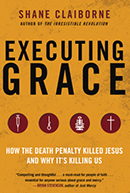Amid the seismic shifts happening within American Christianity, a growing number of the faithful now oppose the death penalty. The Catholic Church has long repudiated the death penalty, and many mainline Protestant denominations do too. Though evangelical Christians have generally favored the death penalty, even the National Association of Evangelicals has shrunk back from its previously supportive stance.
Enter Shane Claiborne, an evangelical leader and author who has recently released a book, “Executing Grace: How the death penalty killed Jesus and why it is killing us.” Unlike some of his progressive Christian compatriots, Claiborne’s approach is Jesus-centric. He wrestles with the issue through the lens of Jesus’ story, teachings, and crucifixion. On the latter, Claiborne emphasizes that Jesus was himself killed by means of capital punishment. Here we discuss what how he believes the executed first-century rabbi changes the way we should think about state-sanctioned death.
RNS: You admit in Executing Grace that you have an agenda, so let’s get that out of the way. What is your agenda exactly?
SC: I want to abolish the death penalty. And I believe we can. Death sentences are the lowest they’ve been in 40 years, and executions the lowest in 20 years. Every year a new state abolishes the death penalty, and only a handful of states are actually executing. I don’t think the question is if will abolish the death penalty but when.
We’re also seeing many conservative and evangelical voices rising to the occasion. One study has shown 80 percent of millennial Christians are against the death penalty. I’d love to see Christians be a part of making history. We can do better than killing to show that killing is wrong.
RNS: You say “the nagging problem of Jesus” is the greatest obstacle for pro-death penalty Christians. Explain.
SC: First, it must be noted that the death penalty has succeeded in America not in spite of Christians, but because of us. Wherever Christians are most concentrated is where executions have been most concentrated. 85% of executions take place in the Bible belt. As my friend Dale Recinella, chaplain on Florida’s death row puts it: “The Bible belt is the death belt.” This troubles me. Many of my fellow Christians have lost the centrality of Jesus, and we’ve used – and misused – Scripture to contradict Christ.
RNS: You mention Jesus, but what about the Hebrew scriptures? Didn’t God establish the death penalty?
SC: The problem with this line of reasoning is that murder was not the only crime that warranted death in the Old Testament. There were some 30 death-worthy crimes listed including working on the Sabbath, witchcraft, adultery, and disrespecting your parents. But here’s the catch. The law also made it nearly impossible to execute someone. The criteria was so strict that executions rarely happened. The rabbis of old said that if a high court executes more than one person in 70 years it is a bloody court.
But that is where Jesus becomes so important. For Christians, Jesus is the lens through which we read Scripture and understand how we are to live. And it is Jesus who becomes the “nagging problem” for pro-death-penalty Christians. Jesus said things like “Blessed are the merciful for they will be shown mercy” and “inasmuch as you forgive you will be forgiven.” It becomes impossible to justify the death penalty with Jesus. When asked if Jesus would support capital punishment only 5 percent of Americans think he would.
RNS: Get specific. The Old Testament mentions an “eye for eye” standard of justice. How do you understand this and how does Jesus factor in?
SC: The “eye for an eye” law was intended to be a limit to retaliation, not a license for it. The goal was to stop the cycle of violence rather than validate or escalate it. One way of thinking of it would be “an eye for an eye… no more.” If someone broke your arm, you couldn’t go break both of theirs, or burn their house down. Even today, we don’t rape those who rape to show that rape is wrong. But somehow in the most severe case of murder we sometimes still cling to this idea that we can kill those who kill to show that it is wrong to kill.
Ironically, it’s Christians – not Jewish people – who use the Hebrew law to justify the death penalty. Even though there were 30 death-worthy crimes in the Old Testament, the Jewish community didn’t like execution and did away with capital punishment hundreds of years ago.
Jesus comes along and says, “You’ve heard it said ‘an eye for an eye… but I tell you.” He says that even if you have a legal right to retaliate, that doesn’t make it right. Limiting violence, as God did in the Old Testament, was a good start. And Jesus fulfills that by saying we shouldn’t harm those who harm us at all. Moses’s law limited violence. Jesus wanted to heal us from violence altogether.
RNS: The subtitle of your book stuns me like ice water: “How the death penalty killed Jesus and why it’s killing us.” What about Christians who say–ala Isaiah–that God, not the death penalty, killed Jesus?

Image courtesy of Shane Claiborne
SC: It’s so important to see Jesus as one who was executed. At the heart of Christianity is an executed Savior, one who was convicted, jailed, shamed, and sentenced to die at the hands of the state beside two other convicted felons. This has held the secret power of the Gospel to oppressed people around the world.
During slavery and lynching, black folks in America looked at Jesus hanging on the tree and saw him as one who was lynched. What if we thought of the cross like we think of a noose, or an electric chair? For centuries, the cross was a terrible symbol of horror, humiliation, and torture. Colossians says that as Jesus willfully dies forgiving those who kill him, he makes a spectacle of death. He triumphs over them with love, forgiveness, and grace. Love steals the show, and turns this tragic story into a love story. Now, any time we rejoice in death, we disgrace the cross.
RNS: Fine. But how could a loving God sacrifice his son, as Christianity holds, unless that God believed in capital punishment?
SC: I once received an email that asked, “How can God be against the death penalty when God used it to save the world?” How we understand Jesus’s death – his execution – is a critical question. Some ways of understanding why Jesus died are toxic and confusing. There are versions of theology that would suggest God had a gun pointed at humanity, and then turned the gun away from us and killed Jesus. I believe Jesus is doing something much different, much deeper and much more beautiful on the cross.
The Bible is full of messed up people, even people who have committed terrible crimes like murder. One of the first murders in the Bible is none other than Moses. Then, there’s David who took another man’s wife and ended up killing that man to cover his tracks. Saul of Tarsus was by every definition a terrorist, a religious extremist, who went door to door trying to kill the early Christians. He oversaw the execution of a young man named Stephen, one of the church’s first martyrs. But he has a radical conversion. If we believe murderers are beyond redemption, then we can rip out half the Bible. Jesus comes in the middle of this story to expose the violence and evil we are all capable of, and triumphing over it in love, forgiving even those who kill him.
The Bible would be much shorter with out grace. In the end, this is a love story. It is about imperfect people falling in love with a merciful God. It reminds that none of us are beyond redemption – not Moses, or David, or Saul, or you, or me. God’s grace is bigger than we can ever imagine.
RNS: Like you, I oppose the death penalty. But I struggle when people ask me about justice for the victims of violent crimes. How is an anti-penalty position compassionate to victims and their families?
SC: This is exactly the right question that must be asked. Violence and evil are real. We see people who are capable of unimaginable brutality, and innocent people must be protected. God is a God of grace, but also a God of justice.
Sometimes folks ask, “What if someone killed your wife or mom?” Actually it is the victims of violence who are against the death penalty that captured my heart. They have become some of the most credible voices in the abolition movement and have taught me that the death penalty is not the best form of justice. It sentences the families to relive the horror for 10 to 20 years, since our system is so broken. The death penalty is much more expensive than alternatives like life in prison, which means less resources available for the victims’ service and prevention.
Some of the most stunning examples of healing I’ve ever seen are families of the murdered who have decided against execution and found better forms of justice and closure. They are living testimonies to the power of grace and forgiveness to heal the heart. They have taught me that when we kill those who kill, we become the very thing we hate. We promote violence, revenge, and retaliation. Dr. King said that capital punishment is “society’s final assertion that we will not forgive.” Violence is the disease, not the cure. The death penalty creates a whole new set of victims.







